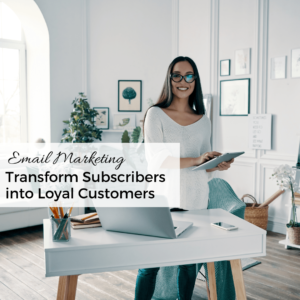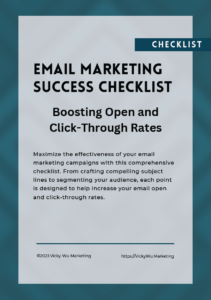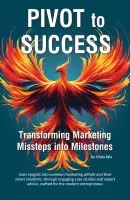Email marketing is more than just a communication tool; it’s a strategic asset for business growth, particularly valuable for entrepreneurs who are performing multiple roles in their business. It offers a blend of direct customer engagement and efficiency, essential for today’s fast-paced business environment and a strategy that no business should overlook.
Why Email Marketing is a Game-Changer for Your Business
Consider this: email marketing boasts an impressive average ROI of $42 for every dollar spent. This efficiency makes it a critical channel for businesses, especially for those who must judiciously allocate their time and resources.
Identifying Your Ideal Subscriber
The success of your email marketing hinges on how well you understand your audience. Since in our changing world of marketing personalization is key, knowing your subscribers’ specific interests and challenges is essential.
This understanding allows you to craft messages that resonate, leading to higher open rates and engagement.
I’m not recommending that you keep anyone off your list; I’m recommending that you segment.
By segmenting your audience and tailoring your content, you can create a more meaningful and effective email marketing campaign.
Creating Email Content That Resonates
The content in your emails is your direct line to your audience. It’s where you share your expertise, offer value, and build trust.
The goal is to create content that not only informs but also engages. This means moving beyond generic updates to providing insights and solutions that address the unique challenges and aspirations of your subscribers.
Your content should be a mix of education, industry insights, and relevant offers that together foster a strong, value-driven relationship with your audience.
The Art of Perfect Timing
Timing is everything in email marketing. The right schedule can significantly impact your email’s performance.
It’s about understanding when your audience is most receptive. Analyzing open rates and engagement patterns can help you pinpoint the optimal time to reach your subscribers. This strategic timing ensures your emails are not just sent, but also seen and acted upon.
Many of the industry-standard email platforms, such as Mailchimp and Constant Contact, can recommend send times based upon your audience’s past engagement.
Leveraging Automation for Efficiency and Personalization
Incorporating automation into your email marketing strategy isn’t just a time-saver; it’s a way to enhance personalization. With automation, you can send targeted messages triggered by specific actions or milestones. This approach ensures that your communication is timely and relevant, increasing the likelihood of engagement.
One of the most overlooked yet effective automations is sending “abandoned cart” emails. Major email marketing providers like Mailchimp offer this functionality, which can be a game-changer for e-commerce businesses. Studies have shown that sending abandoned cart emails can recover up to 10% of lost sales, making it a crucial strategy for boosting revenue.
Automation allows you to maintain consistent contact with your audience without requiring daily input, freeing up your time to focus on other critical aspects of your business, your Zone of Genius where only your expertise can apply.
Enhancing Conversions with A/B Testing
A/B testing is a powerful technique to refine your email strategy. By testing different elements of your emails, from subject lines to call-to-action buttons, you gain insights into what resonates best with your audience. This data-driven approach allows you to continuously improve your campaigns, ensuring that each email you send is more effective than the last. For entrepreneurs, this means making every email count, maximizing the impact of your marketing efforts.
Integrating Email with Your Overall Marketing Strategy
Email marketing shouldn’t exist in a vacuum. It’s most effective when integrated with your overall marketing strategy. This integration ensures that your messaging is cohesive across all channels, reinforcing your brand and amplifying your marketing efforts. For entrepreneurs, this means a unified approach to marketing, where each component works in harmony, leading to a more robust and effective overall strategy.
Upselling and Cross-Selling: Sophisticated Strategies for Email
Effective email marketing can also include strategic upselling and cross-selling. These techniques are not about pushing sales, but rather about offering additional value to your customers. By understanding their needs and preferences, you can present relevant products or services that genuinely enhance their experience with your brand.
Many popular email platforms, such as Mailchimp, Constant Contact, and Campaign Monitor, offer tools specifically designed for upselling and cross-selling. These platforms can seamlessly integrate with e-commerce platforms, including WordPress with WooCommerce, enabling you to leverage customer data for tailored product recommendations. This integration allows for automated yet personalized email campaigns that suggest products based on previous purchases or browsing behavior.
This approach not only drives revenue but also strengthens customer relationships, as it’s based on providing value and solutions. When executed correctly, it transforms your email marketing into a personalized shopping advisor for your customers, enhancing their overall experience with your brand.
Measuring What Matters: Key Metrics for Email Marketing
To gauge the success of your email campaigns, it’s essential to track the right metrics. These indicators not only reflect the performance of your current campaigns but also guide future strategy adjustments. Here are some key metrics to monitor, along with general industry baselines:
- Open Rate: Measures how many people open your email. A good open rate varies by industry, but a general benchmark is around 15-25%.
- Click-Through Rate (CTR): Indicates the percentage of email recipients who clicked on one or more links contained in an email. An average CTR across industries is about 2.5%.
- Conversion Rate: The percentage of email recipients who clicked on a link within an email and completed a desired action, like making a purchase. A standard benchmark is around 1%.
- Bounce Rate: Tracks the percentage of your emails that could not be delivered to the recipient’s inbox. A lower bounce rate, typically below 2%, is ideal.
- Unsubscribe Rate: The rate at which people opt-out of your email list. A rate below 0.5% is generally acceptable.
By monitoring these metrics, you can make informed decisions about your email marketing strategy, ensuring that it remains effective and continues to drive business growth. Keeping an eye on these benchmarks allows you to identify areas of success and those needing improvement, helping you to fine-tune your approach for maximum impact.
At Vicky Wu Marketing, we understand the unique marketing challenges and opportunities you face as an entrepreneur. Our approach, Beyond-the-Graph Growth™, is tailored to drive tangible results while considering the holistic health of your business. Here’s how we can specifically support your email marketing efforts and overall business strategy:
- Bespoke Email Marketing Solutions: We don’t just set up campaigns; we create personalized email marketing strategies that resonate with your target audience. This includes everything from content creation to automation setup, ensuring your emails not only reach but also engage your subscribers.
- 360° Marketing Assessment: Before diving into tactics, we offer a comprehensive review of your marketing landscape. This is more than just a consultation; it’s a deep evaluation of your current strategies, including email marketing, SEO, social media, and customer engagement, to identify areas for improvement and growth.
- Emphasizing Your Zone of Genius: We encourage you to focus on what you do best and delegate the rest. Our team steps in to handle aspects of marketing that may not be your expertise, freeing you up to concentrate on your business’s unique strengths.
- Tailored B2P Marketing Strategies: Recognizing the distinct needs of businesses marketing to other professionals, we offer specialized B2P marketing strategies. This approach is particularly effective for entrepreneurs who require nuanced tactics that differ from conventional B2C and B2B models.







